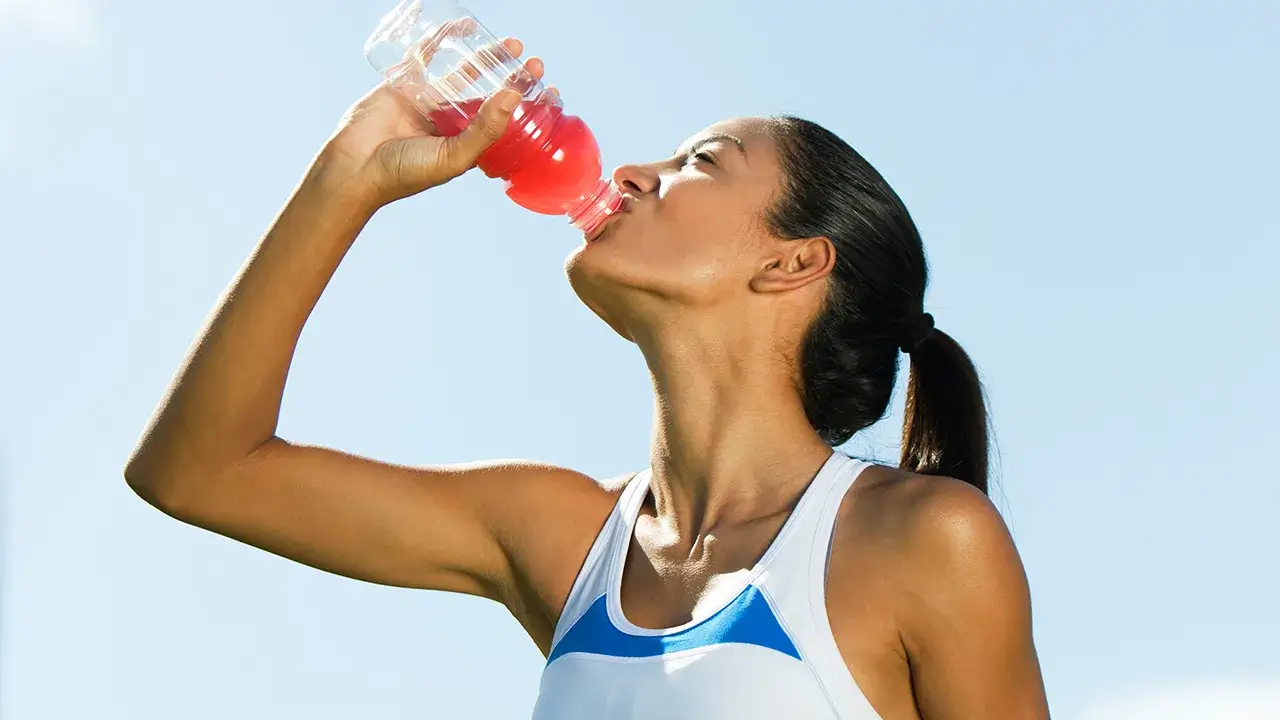6 Essential Electrolytes and Supplements for Endurance Athletes

I. Introduction
Did you know that even a 2% decrease in body weight due to fluid loss can lead to a 20% drop in athletic performance? For endurance athletes, maintaining proper hydration and electrolyte balance is not just about comfort—it’s about reaching peak performance and avoiding potentially dangerous health risks.
Welcome to our guide on “6 Essential Electrolytes and Supplements for Endurance Athletes.” Whether you’re a marathon runner, a long-distance cyclist, or a triathlete, this article will reveal the key nutrients that can make or break your performance. We’ll explore how these vital electrolytes and supplements can help you:
- Push your limits
- Recover faster
- Achieve your athletic goals
Get ready to unlock the secrets of optimal endurance athlete nutrition!
II. Understanding Electrolytes and Their Role in Athletic Performance
Electrolytes are minerals in our blood and other bodily fluids that carry an electric charge. They play a crucial role in maintaining various bodily functions, especially for endurance athletes. Let’s break down their importance:
What are electrolytes?
- Minerals dissolved in your body’s fluids
- Essential for nerve and muscle function
- Key players in hydration and fluid balance
How do electrolytes affect endurance and performance?
- Regulate fluid balance: Help maintain proper hydration during long workouts
- Enable muscle contractions: Essential for sustained physical activity
- Support nerve function: Crucial for muscle coordination and reaction time
- Assist in energy production: Aid in converting nutrients into usable energy
Common symptoms of electrolyte imbalance in athletes:
- Muscle cramps or spasms
- Fatigue or weakness
- Dizziness or confusion
- Irregular heartbeat
- Nausea or vomiting
Understanding these basics of electrolyte supplements for athletes is the first step in optimizing your endurance performance. By maintaining proper electrolyte balance, you can significantly improve your stamina, reduce the risk of fatigue, and enhance your overall athletic performance.
III. Essential Electrolyte #1: Sodium
Sodium is perhaps the most well-known electrolyte, and for good reason. It plays a crucial role in endurance athlete nutrition. Let’s explore why sodium is so important:
Function in the body:
- Regulates fluid balance inside and outside of cells
- Helps maintain blood pressure
- Essential for nerve and muscle function
Importance for endurance athletes:
- Sweat replacement: Sodium is the primary electrolyte lost through sweat
- Hydration: Helps retain water, preventing dehydration during long workouts
- Muscle function: Crucial for preventing muscle cramps during extended exercise
- Performance: Maintains blood volume, supporting cardiovascular function
Recommended intake and sources:
- Daily intake: 1,500-2,300 mg for most adults
- During exercise: 500-700 mg per liter of fluid consumed
Natural sources:
- Table salt
- Pickles
- Olives
- Sports drinks
Potential risks:
- Deficiency: Can lead to hyponatremia (low blood sodium), causing confusion, seizures, and in severe cases, coma
- Excess: May increase blood pressure in some individuals
Pro tip: Listen to your body. If your sweat tastes salty or you see white residue on your clothes after a workout, you might need to increase your sodium intake during exercise.
Remember, proper sodium balance is key to maintaining peak performance in endurance sports. Always consult with a healthcare professional or sports nutritionist to determine the right amount for your individual needs.
IV. Essential Electrolyte #2: Potassium
Potassium is another crucial electrolyte for endurance athletes. It works in tandem with sodium to maintain proper fluid balance and support muscle function. Let’s dive into the details:
Role in muscle function and hydration:
- Helps regulate muscle contractions
- Maintains fluid balance inside cells
- Supports nerve signal transmission
- Aids in glycogen storage, a key energy source for athletes
Benefits for endurance athletes:
- Prevents muscle cramps: Helps muscles relax between contractions
- Supports heart function: Essential for maintaining a steady heartbeat
- Enhances recovery: Aids in replenishing glycogen stores post-exercise
- Balances sodium: Works with sodium to maintain proper hydration
Food sources and supplement options:
Natural sources:
- Bananas
- Sweet potatoes
- Spinach
- Avocados
- White beans
Supplement forms:
- Potassium citrate
- Potassium chloride
- Often included in electrolyte supplements for athletes
Proper dosage and timing:
- Daily intake: 2,600-3,400 mg for adults
- During exercise: 75-300 mg per hour, depending on sweat rate and exercise intensity
- Post-exercise: Include potassium-rich foods in recovery meals
Caution: While potassium is essential, excessive intake can be harmful. It’s best to obtain potassium from food sources unless directed otherwise by a healthcare professional.
Pro tip: Combine potassium-rich foods with sodium sources to optimize electrolyte balance. For example, try a banana with a handful of salted nuts as a pre-workout snack.
Remember, maintaining proper potassium levels is crucial for your endurance athlete nutrition plan. It can significantly impact your performance and recovery, making it an indispensable part of your electrolyte strategy.
V. Essential Electrolyte #3: Magnesium
Magnesium is often overlooked but plays a vital role in endurance athlete nutrition. This mighty mineral is involved in hundreds of bodily processes, making it crucial for optimal performance.
Impact on energy production and muscle recovery:
- Assists in ATP (energy) production
- Supports protein synthesis
- Helps regulate muscle and nerve function
- Aids in blood glucose control
How it aids in endurance performance:
- Reduces fatigue: Helps convert food into energy more efficiently
- Improves oxygen uptake: Enhances respiratory function during exercise
- Supports electrolyte balance: Works with other electrolytes for proper hydration
- Promotes better sleep: Essential for recovery and performance
Natural sources and supplement forms:
Food sources:
- Dark leafy greens (spinach, kale)
- Nuts and seeds (almonds, pumpkin seeds)
- Whole grains
- Dark chocolate
Supplement forms:
- Magnesium citrate
- Magnesium glycinate
- Magnesium oxide
Recommended daily intake for athletes:
- Men: 400-420 mg
- Women: 310-320 mg
- Endurance athletes may need up to 10-20% more
Pro tip: Magnesium absorption can be improved by pairing it with vitamin D. Consider spending some time in the sun or including vitamin D-rich foods in your diet.
Caution: While magnesium toxicity is rare, excessive intake can cause digestive issues. Start with lower doses and gradually increase if needed.
Remember, adequate magnesium intake can significantly enhance your endurance performance and recovery. As with all electrolyte supplements for athletes, it’s best to consult with a sports nutritionist to determine the right amount for your individual needs.
VI. Essential Electrolyte #4: Calcium
While often associated with bone health, calcium plays a crucial role in muscle function and overall athletic performance. Let’s explore why this mineral is vital for endurance athletes.
Function in bone health and muscle contraction:
- Strengthens bones and teeth
- Enables muscle contractions
- Supports nerve signaling
- Aids in blood clotting
Importance for endurance athletes:
- Prevents stress fractures: Essential for maintaining bone density during high-impact activities
- Enhances muscle function: Crucial for sustained muscle contractions during long workouts
- Reduces risk of exercise-induced muscle cramps: Works with other electrolytes to maintain muscle balance
- Supports overall endurance: Helps maintain energy levels during prolonged exercise
Dietary sources and supplementation:
Natural sources:
- Dairy products (milk, yogurt, cheese)
- Leafy greens (kale, collard greens)
- Fortified plant-based milk
- Sardines and salmon (with bones)
Supplement forms:
- Calcium carbonate
- Calcium citrate
Considerations for optimal absorption:
- Recommended daily intake: 1000-1200 mg for most adults
- Timing: Split larger doses throughout the day for better absorption
- Vitamin D: Ensures proper calcium absorption (aim for 15-30 minutes of sunlight daily)
- Avoid excessive iron intake: Iron can interfere with calcium absorption
Pro tip: If you’re lactose intolerant or follow a vegan diet, pay extra attention to your calcium intake. Consider calcium-fortified foods or consult a nutritionist about appropriate supplements.
Remember, while calcium is crucial for endurance athlete nutrition, balance is key. Excessive calcium intake can lead to kidney stones or interfere with the absorption of other minerals. As always, consult with a healthcare professional to determine the right amount for your individual needs.
VII. Essential Supplement #5: Branched-Chain Amino Acids (BCAAs)
While not an electrolyte, Branched-Chain Amino Acids (BCAAs) are crucial supplements for endurance athletes. These essential amino acids play a vital role in muscle function and recovery.
Explanation of BCAAs and their benefits:
- BCAAs consist of three essential amino acids: leucine, isoleucine, and valine
- They make up about 35% of muscle protein
- Unlike other amino acids, BCAAs are metabolized directly in the muscles
How they support endurance and recovery:
- Reduce muscle fatigue: Help lower levels of exercise-induced fatigue
- Decrease muscle soreness: Aid in faster recovery after intense workouts
- Preserve muscle mass: Prevent muscle breakdown during long training sessions
- Enhance fat oxidation: May help utilize fat for energy during endurance activities
Recommended dosage and timing:
- Daily intake: 5-10 grams
- Before workout: 3-5 grams about 30 minutes before exercise
- During workout: 2-3 grams per hour for sessions lasting over 2 hours
- Post-workout: 3-5 grams within 30 minutes after exercise
Potential food sources and supplement options:
Natural sources:
- Lean meats (chicken, beef)
- Fish
- Eggs
- Dairy products
Supplement forms:
- BCAA powders
- BCAA capsules
- Often included in electrolyte supplements for athletes
Pro tip: For optimal results, combine BCAAs with a carbohydrate source during long endurance events. This can help maintain energy levels and reduce muscle breakdown.
Remember, while BCAAs can be beneficial for endurance athlete nutrition, they should complement a well-balanced diet, not replace whole food sources of protein. As always, consult with a sports nutritionist or healthcare professional before adding new supplements to your regimen.
VIII. Essential Supplement #6: Beta-Alanine
Beta-alanine is a non-essential amino acid that has gained popularity among endurance athletes for its potential to enhance performance. Let’s explore why this supplement is becoming a staple in endurance athlete nutrition.
Role in improving endurance and reducing fatigue:
- Increases muscle carnosine levels
- Buffers lactic acid buildup in muscles
- Delays the onset of muscle fatigue
- Potentially improves exercise capacity
How it works in the body:
- Beta-alanine combines with histidine to form carnosine
- Carnosine acts as a pH buffer in muscle cells
- This buffering effect helps maintain optimal pH levels during intense exercise
- Result: Delayed fatigue and improved endurance performance
Proper dosing strategy:
- Daily intake: 2-5 grams
- Loading phase: 4-6 grams daily for 2-4 weeks
- Maintenance phase: 2-3 grams daily
- Timing: Split into smaller doses throughout the day to minimize tingling sensation
Potential side effects and precautions:
- Paresthesia: Harmless tingling sensation, usually in face, neck, and hands
- Timing: Taking smaller, spread-out doses can reduce this effect
- Interaction: May interact with some medications, consult your doctor if you’re on any
Pro tip: Beta-alanine’s effects are cumulative, meaning consistent daily supplementation is key for optimal results. It may take 2-4 weeks of regular use to notice significant improvements in performance.
Research-backed benefits:
- A meta-analysis published in Amino Acids (2012) found that beta-alanine supplementation improved exercise capacity and performance, particularly in high-intensity exercises lasting 1-4 minutes.
Remember, while beta-alanine can be a valuable addition to your electrolyte supplements for athletes regimen, it’s not a magic bullet. It works best when combined with proper training, nutrition, and recovery strategies. As always, consult with a sports nutritionist or healthcare professional before adding new supplements to your routine.
IX. Hydration and Electrolyte Balance
Proper hydration and electrolyte balance are cornerstone principles of endurance athlete nutrition. Let’s explore how to maintain this delicate balance during training and competition.
Importance of proper hydration for endurance athletes:
- Regulates body temperature
- Transports nutrients to cells
- Cushions joints and organs
- Maintains blood volume and cardiovascular function
Tips for maintaining electrolyte balance during training and competition:
- Pre-hydrate: Drink 16-20 oz of water 2-3 hours before exercise
- During exercise: Aim for 4-6 oz every 15-20 minutes
- Post-exercise: Replace 150% of fluid lost within 2-4 hours
- Monitor urine color: Aim for pale yellow (like lemonade)
- Customize intake: Consider factors like climate, intensity, and individual sweat rate
Sports drinks and electrolyte replacement options:
| Option | Pros | Cons | Best For |
|---|---|---|---|
| Water | Natural, calorie-free | Lacks electrolytes | Short, low-intensity workouts |
| Sports Drinks | Contains electrolytes and carbs | Can be high in sugar | Moderate to high-intensity workouts >60 minutes |
| Electrolyte Tablets | Portable, customizable | May lack carbs | Long-distance events, hot conditions |
| Coconut Water | Natural electrolytes | Lower sodium content | Light to moderate workouts |
| Homemade Solutions | Cost-effective, customizable | Requires preparation | All types of workouts |
Pro tip: Create a personalized hydration plan by weighing yourself before and after a typical training session. For every pound lost, aim to drink 16-24 oz of fluid.
Remember, proper hydration is not just about drinking water—it’s about maintaining the right balance of fluids and electrolytes. This balance is crucial for optimal performance and recovery in endurance sports.
X. Personalized Approach to Supplementation
When it comes to endurance athlete nutrition and electrolyte supplements for athletes, one size does not fit all. A personalized approach is crucial for optimal performance and health.
Factors affecting individual needs:
- Training intensity and duration
- Climate and environmental conditions
- Individual sweat rate and composition
- Body size and composition
- Diet and nutritional status
- Genetic factors
- Age and gender
Importance of consulting with a healthcare professional or sports nutritionist:
- Personalized assessment: Evaluates your specific needs based on the factors above
- Prevents deficiencies or excesses: Ensures you’re not under or over-supplementing
- Optimizes performance: Tailors supplementation to your training and competition goals
- Considers medical history: Accounts for any pre-existing conditions or medications
- Monitors progress: Adjusts strategy based on your body’s response and performance outcomes
How to monitor and adjust electrolyte and supplement intake:
- Keep a log: Track your supplement intake, training sessions, and how you feel
- Regular testing: Consider periodic blood tests to check
- Sweat testing: Can provide insights into your individual electrolyte losses
- Performance tracking: Monitor changes in your endurance and recovery
- Listen to your body: Pay attention to signs of deficiency or excess (e.g., muscle cramps, fatigue)
Pro tip: Start with a baseline supplementation plan and make small, gradual adjustments. It’s easier to fine-tune a plan than to overhaul it completely.
Remember, while this guide provides general information, your specific needs may vary. A personalized approach, guided by professionals, can help you achieve the best results in your endurance pursuits.
XI. Conclusion
As we wrap up our exploration of “6 Essential Electrolytes and Supplements for Endurance Athletes,” let’s recap the key points:
- Sodium: The primary electrolyte lost in sweat, crucial for fluid balance
- Potassium: Essential for muscle function and glycogen storage
- Magnesium: Supports energy production and muscle recovery
- Calcium: Vital for bone health and muscle contractions
- Branched-Chain Amino Acids (BCAAs): Aid in muscle recovery and reducing fatigue
- Beta-Alanine: Helps buffer lactic acid and delay muscle fatigue
Remember, these electrolytes and supplements are not magic bullets, but rather tools to support your endurance athlete nutrition strategy. The key takeaways are:
- Balance is crucial: Each electrolyte and supplement plays a unique role in your body’s function.
- Hydration is fundamental: Proper fluid intake goes hand-in-hand with electrolyte balance.
- Personalization matters: Your needs may differ based on various factors, including training intensity, climate, and individual physiology.
- Consistency is key: Regular, appropriate supplementation yields the best results over time.
- Professional guidance is valuable: Consult with healthcare professionals or sports nutritionists for personalized advice.
By understanding and properly implementing these electrolytes and supplements, you can enhance your endurance performance, improve recovery, and potentially reduce the risk of exercise-related health issues.
Remember, optimal nutrition is just one piece of the puzzle. Combine it with proper training, adequate rest, and a positive mindset to reach your full potential as an endurance athlete. Here’s to your success in pushing your limits and achieving your athletic goals!
XII. Additional Resources
To further enhance your knowledge about endurance athlete nutrition and electrolyte supplements for athletes, we’ve compiled a list of reliable resources. These will help you dive deeper into the topics we’ve covered and stay up-to-date with the latest research and recommendations.
Recommended books on endurance nutrition:
- “The Endurance Diet” by Matt Fitzgerald
- “The New Rules of Marathon and Half-Marathon Nutrition” by Matt Fitzgerald
- “Sports Nutrition for Endurance Athletes” by Monique Ryan
- “The Athlete’s Gut” by Patrick Wilson
Reliable websites for further information:
- American College of Sports Medicine
- International Society of Sports Nutrition
- Academy of Nutrition and Dietetics
- Gatorade Sports Science Institute
Pro tip: When reading scientific studies, pay attention to the methodology, sample size, and conclusions. Not all studies are created equal, and it’s important to look at the overall body of research rather than individual studies in isolation.
Remember, while these resources provide valuable information, they should complement, not replace, personalized advice from healthcare professionals or sports nutritionists. Stay curious, keep learning, and continue to refine your approach to nutrition and supplementation as you progress in your endurance journey!



